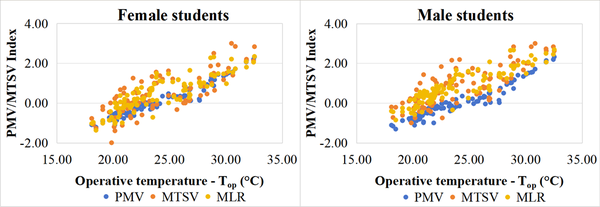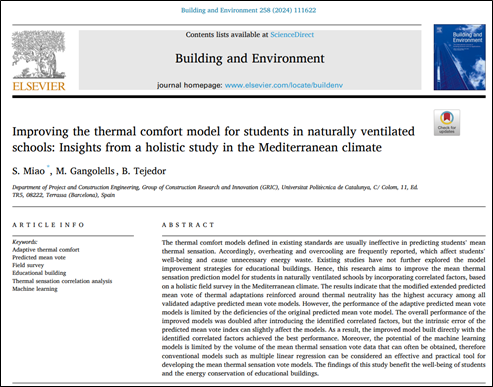The IAQ4EDU project has developed the thermal comfort model for primary and secondary school students in Catalonia
May 16, 2024
The article has been published in the Journal Building and Environment
The IAQ4EDU project has improved existing thermal comfort models and developed the thermal comfort model for primary and secondary school students in Catalonia. The research results are published in JCR-Q1 "Building and Environment" (impact factor: 7.4) in May 2024, titled "Improving the thermal comfort model for students in naturally ventilated schools: Insights from a holistic study in the Mediterranean climate ". This work was completed by doctoral student Sen Miao under the supervision of Dr. Marta Gangolells, principal investigator of the IAQ4EDU project, and Dr. Blanca Tejedor, project researcher.
Thermal sensations of primary school and secondary school students are significantly different from those of adults, and students' thermal adaptability depends on the climate. The thermal comfort models defined in relevant building standards and regulations have been found to be ineffective for primary and secondary school students around the world. Based on the investigation results of the IAQ4EDU project, this work proposed specific strategies to improve the existing thermal comfort models and developed the thermal comfort model for primary and secondary school students in Catalonia. Compared with the model defined by the existing standards, the accuracy of this model is more than doubled, which can achieve high-precision predictions of the thermal comfort of students in different climate zones, education levels, and gender. The proposed methodology and model are of great significance for improving the indoor environment and energy management practices in schools.

Predictions of the improved models developed with MLR
Details can be found in the online version of the article:
http://dx.doi.org/10.1016/j.buildenv.2024.111622
For more information visit our social media pages:
 LinkedIn of the project
LinkedIn of the project  GRIC's Twitter
GRIC's Twitter  ResearchGate
ResearchGate


Share: